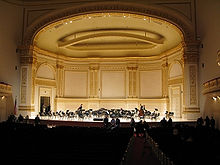Dennison Wheelock
Wheelock was appointed as the first Oneida bandmaster of the internationally acclaimed Carlisle Indian School Band, which performed at world fairs, expositions, and presidential inaugurals.
Dennison grew up impoverished, with the Oneida farm community facing pressures to harvest its timber and a federal push for the allotment of tribal lands to individual households.
He was impressed by a visiting Tuscarora musician, who taught the youth music reading and simple composition for several months.
[5][6] Hamilton-Oneida Academy, now Hamilton College, was a seminary founded in 1793 by Presbyterian Samuel Kirkland as part of his missionary work with the Oneida in New York State, their traditional territory.
In 1892, Pratt appointed Dennison as Carlisle's bandmaster[8][9][10] During the Progressive Era, from the late 19th century until the onset of World War I, Native American performers were major draws and money-makers.
Millions of visitors at world fairs, exhibitions, and parades throughout the United States and Europe saw Native Americans portrayed as the vanishing race, exotic peoples, and objects of modern comparative anthropology.
[11] Reformers and Progressives fought a war of words and images against the popular Wild West shows at world fairs, expositions and parades.
In contrast, Carlisle students were portrayed as a new generation of Native American leadership embracing civilization, education and industry.
[15] The Carlisle Indian Band performed at world fairs, expositions, concert venues and at every national presidential inaugural celebration until the school closed.
[16] Louise LaChapelle (Wheelock), a Chippewa from the White Earth Reservation in northwestern Minnesota, arrived as a student at Carlisle two years earlier than Dennison.
They focused upon the release of Indians from federal control, full citizenship, equal opportunity and education in public schools.
[21] From 1921 to 1922, Captain Pratt lobbied President Warren G. Harding to nominate Wheelock as the Commissioner of Indian Affairs.
[24] Like Dennis, James attended the prestigious Dickinson College Preparatory School after completing his Carlisle studies.
[32] On March 28, 1900, Wheelock and the U.S. Indian Band performed his Aboriginal Suite at Carnegie Hall, a prestigious venue in New York City.
The concert was acclaimed by theatregoers: "A large and genuinely enthusiastic audience greeted the reservation musicians, forcing them to respond to repeated encores.
70,000 people attended one of Wheelock's performances, and his conducting skills earned him a gold medal and silver cup.
[33] In 1903, Wheelock was appointed bandmaster of Haskell Indian School in Lawrence, Kansas, and his performances nationally acclaimed.
[33] In March 1904, a review in Metronome called the band an "up-to-date aggregation of capable musicians trained in every respect for high-class concert work."
[34] In 1904, Wheelock's Haskell Indian Band performed at the Louisiana Purchase Exposition, known as the St. Louis World's Fair.
Pratt had been removed from his position at Carlisle by BIA officials and was unable to assist Wheelock, leading to his resignation from Haskell to find a better paying job.
[38] He said to Wilson, "We believe that you feel, with the progressive members of your race, that it is anomalous permanently to conserve within the nation groups of people whose civic condition by legislation is different from the normal standard of American life."
He "reading the law" as an apprentice at the office of John Miller, head of the Cumberland County Bar Association.
By 1923, he was specializing in representing tribal nations, ranging across the country from those in Washington State to New York, including the Nisqually, Menominee, Mohawk, and Stockbridge-Munsee Band.
As he was increasingly representing these nations in claims and actions related to the federal government, he moved his law practice to Washington, D.C.


















